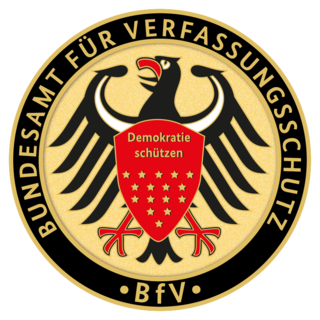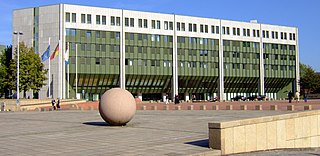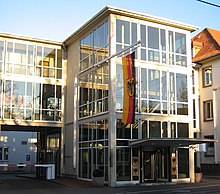
The Federal Office for the Protection of the Constitution is Germany's federal domestic intelligence agency. Together with the Landesämter für Verfassungsschutz (LfV) at the state level, the federal agency is tasked with intelligence-gathering on efforts against the liberal democratic basic order, the existence and security of the federation or one of its states, and the peaceful coexistence of peoples; with counter-intelligence; and with protective security and counter-sabotage. The BfV reports to the Federal Ministry of the Interior and tasks and powers are regulated in the Bundesverfassungsschutzgesetz. The President is Thomas Haldenwang; he was appointed in 2018.

The German Chancellery is an agency serving the executive office of the chancellor of Germany, the head of the federal government, currently Olaf Scholz. The Chancellery's primary function is to assist the chancellor in coordinating the activities of the federal government. The head of the Chancellery holds the rank of either a Secretary of State or a Federal Minister, currently held by Wolfgang Schmidt. The headquarters of the German Chancellery is at the Federal Chancellery building in Berlin, which is the largest government headquarters in the world.

The Federal Ministry of Finance, abbreviated BMF, is the cabinet-level finance ministry of Germany, with its seat at the Detlev-Rohwedder-Haus in Berlin and a secondary office in Bonn. The current Federal Minister of Finance is Christian Lindner (FDP).
The Federal Police is the national and principal federal law enforcement agency of the German Federal Government, being subordinate to the Federal Ministry of the Interior and Community. The Federal Police is primarily responsible for border protection and railroad and aviation/air security. In addition, the agency is responsible, among other tasks, for the protection of federal constitutional bodies. It provides the federal alert police and GSG 9 special police unit, which can also be used to support the federated states of Germany. Ordinary police forces, meanwhile, are under the administration of the individual German states (Bundesländer) and are known as the Landespolizei. In addition to the Federal Police, the Federal Criminal Police Office and the German Parliament Police exist as further police authorities at the federal level.

In Austria, the Ministry of the Interior is a federal government agency serving as the interior ministry of the Austrian government. It is chiefly responsible for the public security, but also deals with matters relating to citizenship, elections, referendums, plebiscites and the alternative civilian service. The Ministry of the Interior is considered one of the most important ministries in Austria

The Federal Ministry of Defence, abbreviated BMVg, is a top-level federal agency, headed by the Federal Minister of Defence as a member of the Cabinet of Germany. The ministry is headquartered at the Hardthöhe district in Bonn and has a second office in the Bendlerblock building in Berlin, which is occasionally used as a metonym to denote the entire Ministry.

The Federal Ministry of Food and Agriculture, abbreviated BMEL, is a cabinet-level ministry of the Federal Republic of Germany. Its primary headquarters are located in Bonn with a secondary office in Berlin. From 1949 to 2001 it was known as the Ministry for Food, Agriculture and Forests. Through an organizational order by the German Chancellor on 22 January 2001, it became the Federal Ministry for Consumer Protection, Food and Agriculture after the Consumer protection function was transferred from the Federal Ministry for Health. The name Federal Ministry for Food, Agriculture and Consumer Protection was adopted on 22 November 2005 simply to alphabetize its functional parts in the German language. Due to the political restructurings of the 18th German Bundestag in December 2013 the division "Consumer Protection" was transferred to the Federal Ministry of Justice and Consumer Protection.

The Federal Ministry of Justice, abbreviated BMJ, is a cabinet-level ministry of the Federal Republic of Germany. Under the German federal system, individual States are most responsible for the administration of justice and the application of penalties. The Federal Ministry of Justice devotes itself to creating and changing law in the classic core areas related to Constitutional law. The Ministry also analyzes the legality and constitutionality of laws prepared by other ministries. The German Federal Court of Justice, the German Patent and Trade Mark Office (GPTO), and the German Patent Court all fall under its scope, including affairs on court administration. The ministry is officially located in Berlin.

The Federal Criminal Police Office of Germany is the federal investigative police agency of Germany, directly subordinated to the Federal Ministry of the Interior. It is headquartered in Wiesbaden, Hesse, and maintains major branch offices in Berlin and Meckenheim near Bonn. It has been headed by Holger Münch since December 2014.

The Reich Ministry for Public Enlightenment and Propaganda, also known simply as the Ministry of Propaganda, controlled the content of the press, literature, visual arts, film, theater, music and radio in Nazi Germany.

The Federal Ministry for the Environment, Nature Conservation, Nuclear Safety and Consumer Protection, abbreviated BMUV, is a cabinet-level ministry of the Federal Republic of Germany. It has branches in Bonn and Berlin.
The counter-terrorism page primarily deals with special police or military organizations that carry out arrest or direct combat with terrorists. This page deals with the other aspects of counter-terrorism:

In many countries, particularly those with a federal system of government, there may be several law enforcement agencies, police or police-like organizations, each serving different levels of government and enforcing different subsets of the applicable law.
The Directorate General for Public Security is the governing body of general law enforcement in Austria and a division of the Ministry of the Interior. It oversees the Federal Police, the Criminal Intelligence Service, the Intelligence Directorate, the EKO Cobra, and the Aerial Police.
The Department of Home Affairs is a department of the Government of Australia that is charged with responsibilities for national security, protective services, emergency management, border control, immigration, refugees, citizenship, transport security and multicultural affairs. The Home Affairs portfolio reports to the Minister for Home Affairs, currently held by Tony Burke, and was led by the Secretary of the Department of Home Affairs, Mike Pezzullo, until his sacking in November 2023 for breaching the code of conduct.

The Office for the Protection of the Constitution of Rhineland-Palatinate is a department of the Ministry of the Interior and Sport of the State of Rhineland-Palatinate and has the legal mandate to protect the free democratic basic order as well as the existence and security of the federal government and the states. Its headquarters are in Mainz. Since the beginning of 2017, the Office for the Protection of the Constitution in Rhineland-Palatinate has been headed by Elmar May.

















